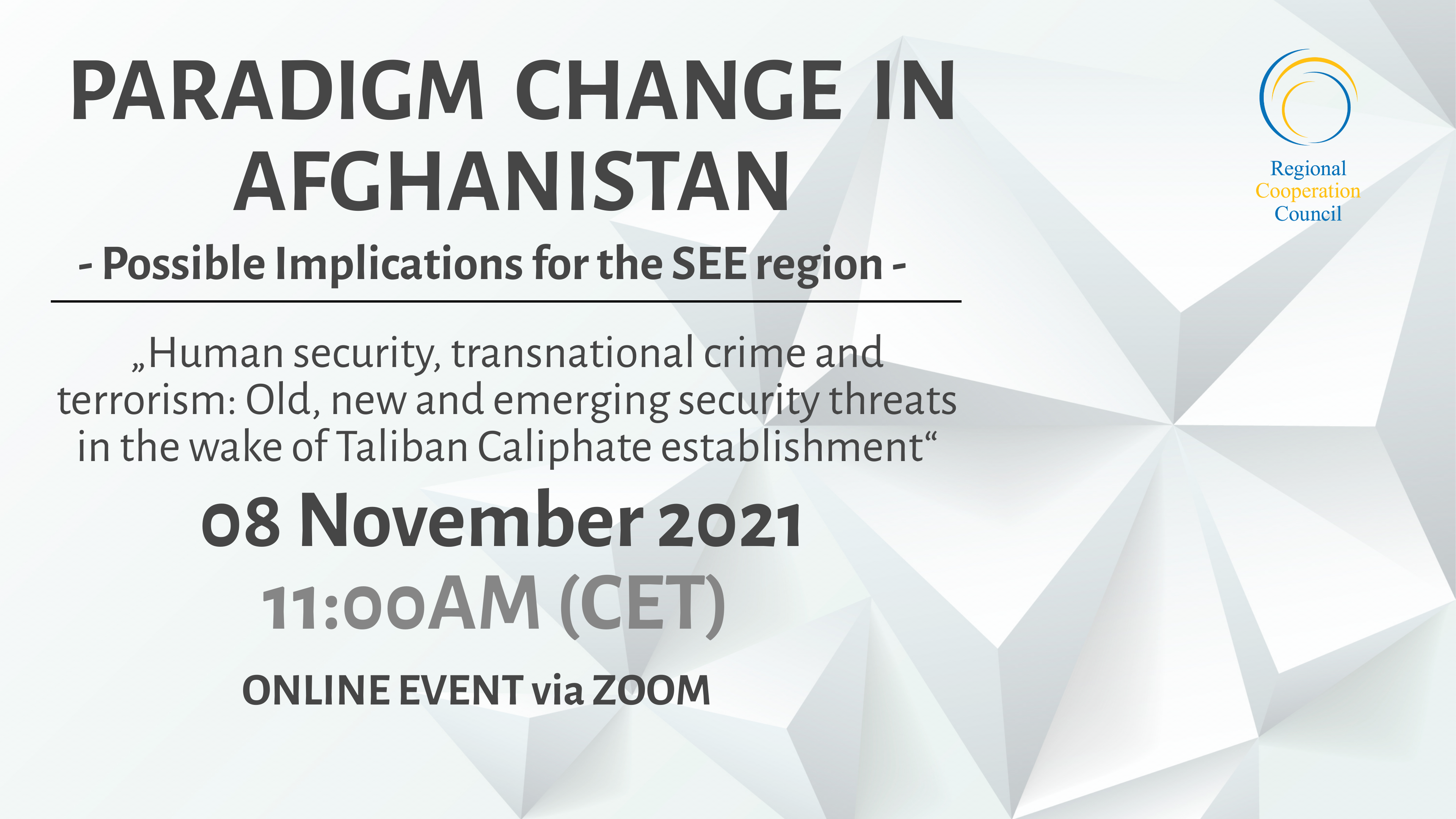- Home/
- Event details
PARADIGM CHANGE IN AFGHANISTAN: Human security, transnational crime and terrorism: Old, new and emerging security threats in the wake of Taliban Caliphate establishment

Developments in Afghanistan have taken central stage in the world news in recent weeks. Speculations have arisen regarding the possibilities of another large influx of refugees to Europe and to the Balkans and the repeat of the 2015-2016 refugee crisis. So far, that does not appear to be the case, at least not on such a scale, but it is not granted Balkan route will not once again become active.
The current paradigm shift in Afghanistan that brought the Taliban back to power has opened discussions about various internal and geopolitical consequences. Prior to its initial dislocation, the Taliban Khalifat used to serve as the safe haven for various terrorist and extremist groups directed against Western values and targets.
The situation now developing in Afghanistan is one in which the country's new leaders are comfortable with or committed to an extreme interpretation of religion, maintain relations with terrorist groups like al-Qa`ida and promulgate an autocratic political system that denies democracy. This raises multiple questions for South East Europe, not least whether we may expect a new outflow of citizens to the system of religious extremism, as was the case with Syria and Iraq during the rule of ISIS, threatening the future peace and prosperity.
RCC will organize an expert discussion with relevant governmental stakeholders, to address the following key questions:
- To what extent can such withdrawal of the international community in Afghanistan encourage terrorist insurgents across the world, and what are the security implications for the region of SEE? What can we do to mitigate and prevent possible security-related implications?
- To what extent are the governments ready to cope with potential secuirty-related challenges, and are these challenges overestimated or underestimated?
- The six SEE economies (Bosnia and Herzegovina, Montenegro, Serbia, Kosovo*, North Macedonia, Albania) have the Joint Action plan for Counter-Terrorism, but should it and to what extent be upgraded given the new circumstances?
- The Region has proven to be vulnerable and even susceptible to violent extremist narratives. The situation in Afghanistan can be also viewed as a triumph for the Taliban propaganda with global implications and is seen as an important step forward by the global Islamist terrorist movement. Will the situation in Afghanistan contribute to the strengthening of extremist narratives in the SEE region? Are there mechanisms to prevent it?
- Terrorist insurgency is getting more sophisticated and more active in the virtual sphere. Can we cope with it, especially now that they marched into a physical territory?
- How much will the situation in Afghanistan motivate the insurgents in other places (including FTFs from the SEE) to join extremist groups like the ones in Syria and Iraq, and how likely are the chances that the country will again become a haven for jihadist groups?
- To what extent does the Afghanistan situation create another migrant crisis for Europe and the SEE region?[1] Are there any new challenges related to migrants from Afghanistan already residing in Europe?
- The most likely threat to the rest of the world from the Taliban's new arsenal of weapons is the potential of terror groups to get their hands on those weapons. Is it a real threat or spin: Should weapons in Taliban hands worry us? And how significant is this weaponry?
- For years many Afghan women’s rights activists have been publicly warning that the insurgents’ territorial expansion posed a threat to women’s security. Under the Taliban regime the rights of women and girls, including access to education, markets, and basic health services, are diminishing. After the international community was evacuated, many Afghan women voiced their sense of abandonment, anger, and despair. What will happen to women and girls in Afghanistan and is there a role for the international community to play?
Register in advance for this webinar:
Please, click here to start your registration
Or on this link below:
https://us02web.zoom.us/webinar/register/WN_XtWE7Vz4RSubEKclWU6Mew
[1] BRUSSELS, Aug 30 (Reuters) - European Union states are determined to prevent uncontrolled migration from Afghanistan following the takeover of the country by the Taliban. https://www.reuters.com/world/eu-seek-stop-mass-afghanistan-migration-flows-draft-statement-says-2021-08-30/
| Documents | Agenda |
|---|


 Development of specialized PCVE web site is funded by EU FUNDS CN 2017-386/831 - "IPA II 2016 Regional Action on P/CVE in the Western Balkans"
Development of specialized PCVE web site is funded by EU FUNDS CN 2017-386/831 - "IPA II 2016 Regional Action on P/CVE in the Western Balkans"